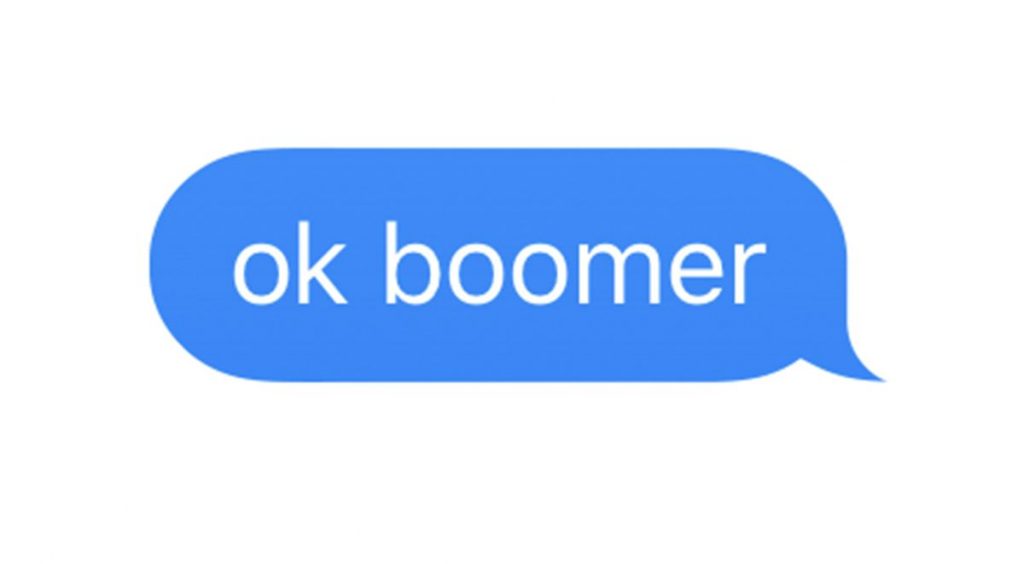
The internet has become a spawn of trends, phrases, and fashions that would be unimaginable without the internet’s unique ability to spread information faster than ever before. With that comes the rise of apps and websites like TikTok, Vine, and Instagram, all of which have been the main perpetrators of such things like the Cinnamon challenge, the Tide Pod meme, and the internet’s latest phrase: “ok boomer.”
The origins of “ok boomer” can be broken down into its cycles. This particular meme has a rather unusual lifestyle. Many think the term was first coined in April 2018, or that it was created by Instagram user @Bones3.0. It didn’t gain traction until January 2019 in a TikTok featuring an older user by the username of @old_school_is_not_so_bad claiming all millennials have “Peter Pan syndrome,” which is a mental disorder in which the affected has no desire to crowd.
He continues down a rabbit hole that millennials won’t ever do anything for themselves. Though this video has been duetted several thousand times, the one TikTok that stands out is a video of a young teenage boy holding up a sign that simply says “ok boomer” in response to @old_school_is_not_so_bad’s rant. This video catapulted into fame in July 2019, bringing the phrase into the public eye. Though @old_school_is_not_so_bad has since either deleted his account or had it taken down, the audio clip of his rant on millennials continues to be remixed. One of the more recent uses of the phrase that has caught public attention is by New Zealand MP Chloe Swarbrick.
When interrupted by a heckler during a speech on climate change, she simply remarked “ok boomer” and continued speaking. Within the past few days, Fox has attempted to trademark it, resulting in protests from the University of Oklahoma, which has always had the phrase “boomer” as part of their mascot.
Now that we’ve established the origins of “ok boomer,” what exactly does it mean? The urban dictionary has multiple definitions, ranging from a derogatory term used to insult and belittle boomers to something as mild as an eye roll. It has also been described as the “n-word of ageism” by conservative radio show host Bob Lonsberry, which is simply preposterous.
The only generation offended by this phrase is the boomer generation as well as a few select Gen Xers. Gen Z continues to perpetuate it, millennials are cheering them on, and the Silent Generation is living up to its title by not responding at all. There have been countless articles published that were written by boomers or Gen Xers, almost all of them agreeing that the phrase is harmful. However, the general consensus is that the phrase is that is a “flippant Gen-Z retort for dismissing outdated viewpoints held by Baby Boomers.”
However, there is a degree of danger that comes with using this phrase, especially in the workplace. Workers over 40 are protected by the Age Discrimination in Employment Act, so if you were to use the phrase “ok boomer” in the workplace, it’s possible that you would be liable for workplace discrimination. The problem with the phrase is that it is used to discriminate based on age – if it were used for anything else, then the danger of using the phrase in the workplace is greatly deduced.
The phrase “ok boomer” is being taken way too seriously. The fact that it can be an excuse to file for workplace harassment, countless articles denouncing the use of the phrase, and it’s been compared to the “n-word” is outlandish in nature, especially with regard to the “n-word.” In the words of John Mulaney, “when you’re comparing the badness of two words, and you can’t say one of the words, that’s the worst one.” The phrase is similar to the boomer word “snowflake,” but “ok boomer” is used as a retaliation against a generation that has destroyed the planet and discriminated against younger generations for ages. It isn’t derogatory in nature.
Perhaps the most fascinating nature of the phrase is how quickly it became a rallying cry for younger generations once the phrase came to light. Sites like TikTok, Instagram, and Reddit have spread its message, uniting both Gen Zers and millennials alike to finally have a way to face the outdated stereotypes and world views that many boomers hold. Though the younger generations have been called lazy, unmotivated, and “snowflakes” for years, the phrase “ok boomer” has done in boomers and Gen Xers. It goes to show how internet culture has shaped the generations that grew up with it and how their views and opinions differ so greatly from the older generations.
